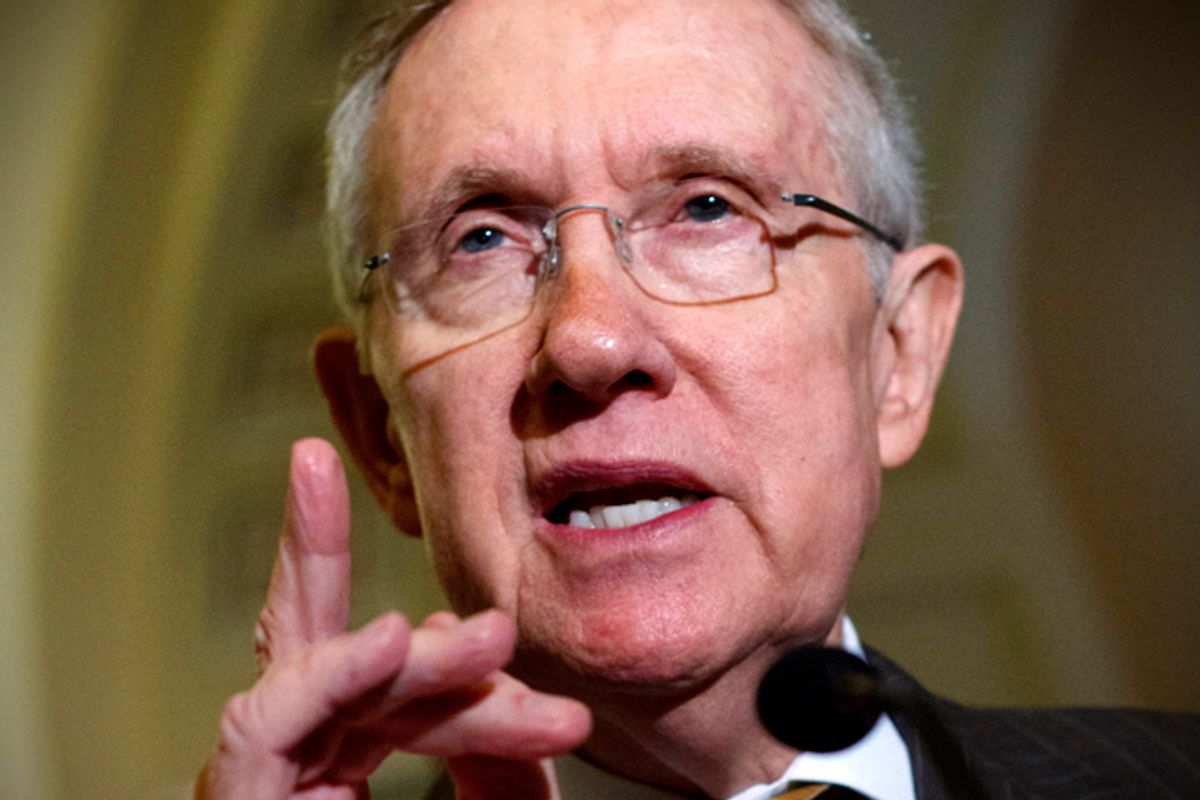The road to filibuster reform has seen a lot of false starts and broken promises, but this time it feels different. Facing a deep backlog of executive branch nominees blocked by Republicans, Senate Majority Leader Harry Reid has his finger on the metaphorical button and is ready to push; whether by "nuclear option" or by vote, the days of the GOP's ability to filibuster Obama's executive nominees looks numbered.
Reid said today he'll move to end debate on a slate of appointees, warning Republicans that if they continue to try to block them, “we know what’s going to happen.” Democrats will meet later today and depending on the temperature in the room, Reid may decide to move ahead with a vote to change the rules or invoke the so-called nuclear option, when the majority leader overrules the parliamentarian and disregards a rule, effectively killing it. But either way, the filibuster on executive nominees could be dead by next week. "I want this resolved, one way or the other," Reid said.
"By filing cloture on all of them, Reid is giving Republicans one last chance to move on them, on the theory that if they fail to do so, it will help drive home to fellow Dems -- and the media, and the American people -- that they really have no choice but to hit the nuke button," Greg Sargent notes. The move would only apply to executive nominees, not judicial nominees or legislation, but it's still a major blow to the filibuster.
Republican Leader Mitch McConnell issued a fiery response to Reid on the Senate floor today, saying, "The majority leader is about to sacrifice his reputation and this institution." But as Ezra Klein points out, Republicans are basically powerless to resist because there's nothing left for them to use to take revenge on Democrats. They've already obstructed everything they can at about the maximum level possible. Reid's patience for such games appears to be spent. And it's not hard to see why.
There are 184 pending executive nominees, including the would-be heads of the EPA and the Labor Department, who have waited on average eight months, since their nomination. And in Obama's second term, the Senate has confirmed only 34 executive nominees, through the July 4 recess. During the same period in George Bush's second term, the Senate had confirmed 118.
A Senate Democratic leadership aide says the threat is very serious. Reid is scheduled to appear on "Meet the Press" this Sunday and at the Center for American Progress next week to discuss filibuster reform, suggesting he's ready to wage the public relations campaign needed for a critical change to Senate rules like this.
It's a long way for Reid to come on the filibuster, going from one of its stronger defenders to the man who is poised to kill it, at least for executive nominees. When the new Congress convened in January 2011, after an election in which Republicans captured the House, freshman Sens. Jeff Merkley and Tom Udall, among others, wanted Democrats to use the unusual rules of the Senate's first legislative day to change the rules by a simple majority vote, instead of the normal 67 needed. Reid refused, and instead made a handshake deal with McConnell that proved disappointing almost immediately.
Ten months later, he went to the Senate floor and admitted his error. "These two young, fine senators said it was time to change the rules of the Senate, and we didn’t. They were right. The rest of us were wrong -- or most of us, anyway. What a shame," Reid said, speaking to Merkley, who was presiding. "I am almost embarrassed."
When a new Congress again created the opportunity in January of this year, Democrats took another pass. Reid created an opening by keeping the first legislative day technically open for over a week, but ultimately said he didn't have enough support from Democrats. Instead, Reid cut another weak handshake deal that did not help much.
It's not the filibuster overhaul many progressives would like, but it's a big step in that direction. And this time, Reid looks serious. We'll find out if he is soon enough.



Shares